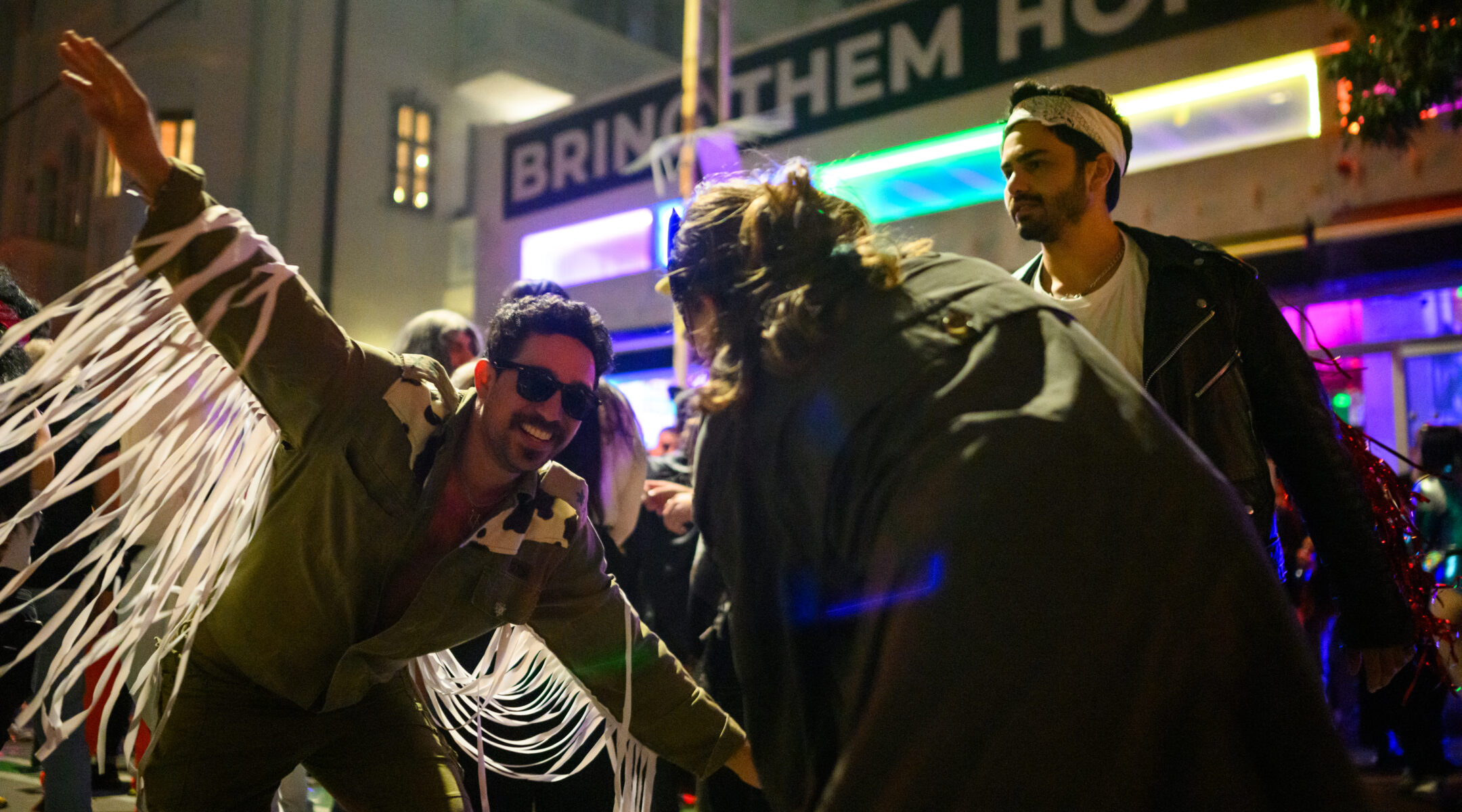(JTA) — In Jerusalem, a service omitted the loud noise-making associated with the holiday in order to accommodate soldiers traumatized by months of war. In Tel Aviv, bakeries peddled a triangular treat renamed for a contemporary villain, the leader of Hamas. And in Jewish communities around the world, costumes and holiday gifts paid homage to the more than 130 Israeli captives who remain in Gaza.
Those adjustments marked some of the many ways that Purim, a generally whimsical Jewish holiday that celebrates an ancient victory over a threatened genocide, took a different shape this year because of ongoing war and hostage crisis looming over Israel and Jewish communities around the world.
Many communities went ahead with the merrymaking expected of the holiday, with synagogues holding Purim carnivals for children and, in some cases, debauched parties for adults. Spiels, or festive plays retelling the Purim story, drew from a wide range of of-the-moment themes, including Barbie and Taylor Swift. In Israel, the streets filled as usual with costumed children.
But there were signs that it was not a typical Purim, starting with the hamantaschen sold in Israel this year. The Hebrew name for the cookies is “Oznei Haman” or Haman’s ears, named for the villain in the Purim story. This year, some bakeries renamed them “Oznei Sinwar,” a reference to Yahya Sinwar, the (notably large-eared) Hamas leader credited with masterminding the Oct. 7 attack on Israel that triggered the current war.
In the days leading up to and including the holiday, the war made itself felt in other ways. Some wrestled with how to celebrate at a time of such sadness. Some grappled with the contemporary implications of a chapter of the Purim story that suggests that the Jews, once saved in ancient Persia, exacted steep revenge. And some incorporated the themes, and trauma, of the war into their Purim costumes and practices.
After a returned soldier posted on the local Facebook group Secret Jerusalem that he was looking for a subdued Purim service — ”Enough time in battle and I just need a quiet one” — Chabad of Rehavia added a noise-free service to its plans. Because of a verse in the Scroll of Esther about “walled cities,” Purim is celebrated a day later in Jerusalem than in the rest of the world; the city went ahead Monday with its first official Purim Parade for the first time in more than four decades, though its attendance was reportedly lower than expected.
In posts on social media displaying Purim costumes, an unusual number of soldiers could be spotted among the pirates, Queen Esthers and astronauts in children’s parades. Rachel Edri, who became famous after offering cookies to her Hamas captors in October, shared pictures of a number of people of all ages who had dressed as her.
Others aimed to use the holiday to galvanize support for releasing the hostages. Celebrating in Texas, the influencers dubbed That Jewish Family on Instagram dressed in all yellow in a nod to the yellow ribbons that have come to represent the hostages. Many people posted pictures on social media of Kfir and Ariel Bibas, the young brothers who are the only children who remain in Gaza, in their Batman costumes from last year; a rally in New York City saw participants dress up as Batman in honor of the Bibas family. And Melinda Strauss, an Orthodox influencer in the New York City area, posted pictures of mishloach manot, the traditional food gifts given on the holiday, that came with names of hostages to keep in mind; she herself had made a maple cake beloved by a mother murdered on Oct. 7 to give to her own friends.
Some attendees wore costumes to the weekly Saturday night rally in Tel Aviv to raise attention to the hostages. One woman turned the iconic hostage poster into a costume for herself, aiming to extend the posters’ effort to raise awareness about the remaining captives at a time when Israel is negotiating for the release of more of them. During the holiday, the news leaked that Israel has offered to release 800 prisoners to secure the safety of 40 hostages during a potential ceasefire. Officials reportedly believe the odds of an eventual deal are just even.
Despite the adjustments to the holiday, the celebrations elicited tensions from those whose grief remains raw.
“I’m not doing Purim this year. That’s it. I am not moving on. It feels too cruel,” Elana Sztokman, an Israeli anthropologist, educator and activist, wrote in her Substack newsletter. She said the holiday had made her even more conscious of the fact that Israel’s leadership has not acted as aggressively as she and many others would like to secure the hostages’ release.
“Does Jewish peoplehood even exist if some people are kind of expendable? Sacrificable? Or are peoplehood and community just fictions we keep telling ourselves? So that we can have fun moments like Purim parties?”
While one family member of a current hostage read psalms at a Purim service, others wrestled openly with how much to take part in the holiday.
“Every [Instagram] story of mine is of parties, of people who are happy and celebrating life. On the one hand deserves to celebrate life and be happy,” Maya Regev, who was held hostage until November, said in a statement posted to the social media account dedicated to her best friend Omer Shem-Tov, who remains in captivity. “On the other hand, I’m angry. I’m angry when I think of Omer and how much he would have loved to be here celebrating with us.”
JTA has documented Jewish history in real-time for over a century. Keep our journalism strong by joining us in supporting independent, award-winning reporting.






